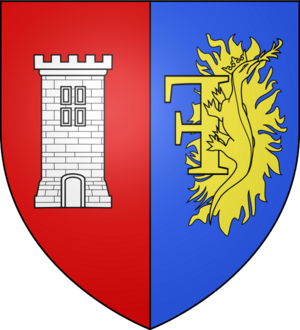Barbentane facts for kids
Barbentane is a small town, also called a commune, located in the south of France. In 2005, about 3,660 people lived there. It is part of the beautiful region called Provence-Alpes-Côte d'Azur. You can find it in the Bouches-du-Rhône department.
Contents
Discovering Barbentane
Barbentane is known for its interesting history and charming old buildings. It's a place where you can see how people lived long ago. The town is surrounded by lovely landscapes, typical of the south of France.
Location and Surroundings
Barbentane is in a special spot where two rivers meet: the Durance and the Rhone. This area is very green and has been important for travel and trade for many years. The town is built on a hill, which gives it great views of the countryside.
Historic Buildings and Landmarks
Barbentane has several old structures that tell stories of its past.
The Anglica Tower
One famous building is the Tour Anglica, or Anglica Tower. This tower was built a very long time ago, in the 14th century. A powerful church leader named Cardinal Angel de Grimoard ordered it to be built. He was the brother of Pope Urban V.
The Town Hall
The Town Hall, or Hôtel de Ville, is another important building in Barbentane. It's where the local government works and decisions are made for the community.
Old Gates and Churches
As you walk through Barbentane, you might see old town gates like the Calendrale Gate and the Séquier Gate. These gates were once part of the town's defenses. There is also a beautiful church called Notre-Dame-des-Grâces, which is a key part of the town's history and culture.
Unique Homes
Some homes in Barbentane are quite unique, including cave dwellings. These are houses built into natural caves, showing how people adapted to their environment.
Images for kids
-
Drawing and description of the Tour Angelica (Anglica Tower), built in the 14th century at Barbentane by order of Cardinal Angel de Grimoard brother of Urban V in the Departmental Archives of Vaucluse
See also
 In Spanish: Barbentane para niños
In Spanish: Barbentane para niños
 | Toni Morrison |
 | Barack Obama |
 | Martin Luther King Jr. |
 | Ralph Bunche |
















